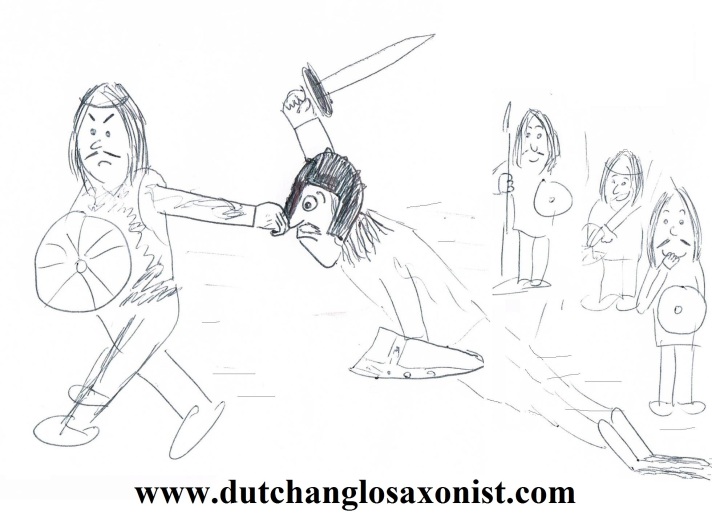Alfred and the cakes, Cnut and the waves, and Eadmer the flying monk: Anglo-Saxon history is full of anecdotes. On this blog I will regularly highlight some amusing and/or remarkable episodes from early medieval England, along with a self-made cartoon. This blog discusses on how Eldol of Gloucester led Hengest by the nose…
Escaping the Night of the Long Knives with a stick
In my previous blog on an Anglo-Saxon anecdote, I discussed the story of the original Night of the Long Knives, when the fifth-century Anglo-Saxon leader Hengest ordered his Saxon followers to kill their British neighbours (You can read up on this here). Not all the Britons were killed that night, however, as the ever-reliable Geoffrey of Monmouth (c. 1100-1155) tells us in his Historia Regum Brittanniae [The History of the British Kings]. Geoffrey reports how one Briton escaped (using a stick) and made sure that Hengest would get his comeuppance. This is the story of Eldol of Gloucester.
Eldol escaped the treacherous Anglo-Saxon onslaught by grabbing a wooden stick and “[i]f anyone approached him, he struck him so hard that his limbs would break and he would be dispatched straight to Hell. Eldol smashed heads and arms and shoulders and legs, inspiring the Saxons with great terror.” (Geoffrey of Monmouth, Historia, bk. VI, ch. 16). Before he managed to escape, Eldol had killed seventy men with his stick.
Leading Hengest by the nose
At a later date, Hengest and his Saxon troops ambush a British army, led by Aurelius Ambrosius (the uncle of King Arthur). Among the Britons, we find Eldol and he and Hengest come to blows:
O how these men were mighty in battle above all others! As they deal stroke after stroke to each other, sparks flew up from their blades like thunder and lightning. For a long while it was unclear which of the two possessed the greater strength: first Eldol would press forward and Hengest would fall back, then Eldol would lose ground while Hengest prevailed. (Geoffrey of Monmouth, Historia, bk. VIII, ch. 6)
Then, Eldol decides to play dirty:
“He seized Hengest by the noseguard of his helmet and, exerting all his strength, dragged him back behind the British lines. With the greatest joy, Eldol then cried aloud: ‘God has granted my wish! Press on, soldiers, press on! […] Victory is now within your grasp! With Hengest defeated, you have won!’” (Geoffrey of Monmouth, Historia, bk. VIII, ch. 6)

Eldol eventually cuts off Hengest head and rejoices some more.
The English idiom “to lead someone by the nose” means ‘to force someone to go somewhere’. People will tell you this phrase goes back to “the fact that a cow is sometimes led by rope attached to a ring in its nose”. You now know better…
Works referred to:
- Geoffrey of Monmouth, The History of the Kings of Britain, trans. M. A. Faletra (2008)
If you liked this post, you may also like An Anglo-Saxon Anecdote: The Real Night of the Long Knives

You may be amused to know that the Dutch-South African philologist A.C. Bowman back in 1965, and Simonne d’Ardenne independently the following year, proposed that the “hengest” (stallion) on the controversial right panel of the Franks Casket represents Hengest, mourning his brother Horsa inside the central mound. The strange man-horse-spirit creature on the left with the caption “Here Hos sits on the sorrow-mound” would then be Horsa again, now as a departed spirit sitting on his own burial mound.
In my webpage at http://www.econ.ohio-state.edu/jhm/arch/FranksCasket/ I argue that the warrior confronting this Hos/Horsa is Hengest himself, this time as a man. Notice that his helmet has a very conspicuous nose guard!
I further argue that the reappearance of this man-Hengest in the Trojan War scene on the lid may be intended to invoke an analogy between the Night of the Long Knives and the Trojan Horse, with Hengest playing the role of Odysseus, and Horsa that of Achilles.
Thanks for the tip about the tapestry in Ivanhoe!
LikeLike
Interesting, thanks for your enlightening comment!
LikeLike